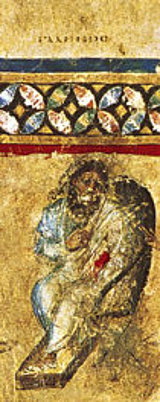Task of the Project
Galen of Pergamum: The Transmission, Interpretation and Completion of Ancient Medicine
Functioning as an independent research facility, the project involves edition, translation, commentary and historical contextualisation of Galen’s works. The edition series of the CMG and CML, which, as reference editions in the field of ancient medicine, have set a new standard for critical editions of ancient technical literature, continue to exist and will be issued in digital form to meet the needs of a broad readership not necessarily trained in philology. The project is understood to be a research institution rather than an editorial one. Where substantial points of contact exist, international cooperation will take place with other partners. However, the project has been planned in such a way as to ensure that goals can be attained independently of the contributions by external colleagues. External editions will be supervised by members of the advisory committee, which has yet to be established. Inclusion in the series will be determined by an anonymous peer review process. Furthermore, thanks to the use of suitable editing software, external staff will be able to perform much of the publishing work themselves.
Cooperation with orientalists constitutes an important element of the project. In order to guarantee external colleagues publication of their results, the “Supplementum Orientale” of the CMG Series, will incorporate Arabic (or Syriac) translations also of those texts which have survived in Greek.
The Galenic Corpus is by far the largest collection of extant writings by a single Greek author. But unlike the works of any other ancient author, a large part of Galen’s oeuvre has yet to be published in historico-critical editions. The sheer quantity of text and the frequent complexity of the manuscript tradition would seem to make it impossible for the project group to foresee a publication of a complete edition. This is why a selection has been made, on the basis of content-related criteria, of texts to be worked on by the project group. The project is consequently focused on influential texts and issues which are clearly located–as is wholly typical for ancient medicine–at the interface of fields which are today termed the natural sciences and the humanities, and which therefore have an interdisciplinary bearing on the questions at hand. These are:
- Epistemology and the commentary as scientific form of expression
- Nosology
- Theory of the soul and topology of the body
- Therapeutics
In this way, the project’s relation to ongoing debates in the relevant areas can be strengthened. At the same time, such a focus also promotes connectivity to rapidly developing Berlin projects in the fields of ancient philosophy, philosophical psychology and the history of science. Only through such an interdisciplinary embedding can sufficient light be cast on the Galenic writings, in which, alongside medical viewpoints, an important, often fundamental role is played by historical, natural historical philological, metaphysical, ethical, psychological and epistemological interests.
Within this project critical editions of the following works are currently (January 2025) in preparation:
- Galeni De morborum differentiis, De morborum causis, De symptomatum causis (Roland Wittwer)
- Galeni Methodus medendi (Wolfram Brunschön, NN)
The CMG and CML series, which are regarded as reference editions in the field of ancient medicine and have set new standards for historical-critical editions of specialist ancient texts beyond the field, continue to exist. The advisory board of the project also acts as the editorial board for the series. An anonymous peer-review process will decide on inclusion in the series. Print preparation is to be carried out largely by the external collaborators in cooperation with the De Gruyter publishing house through the use of suitable editing software.



